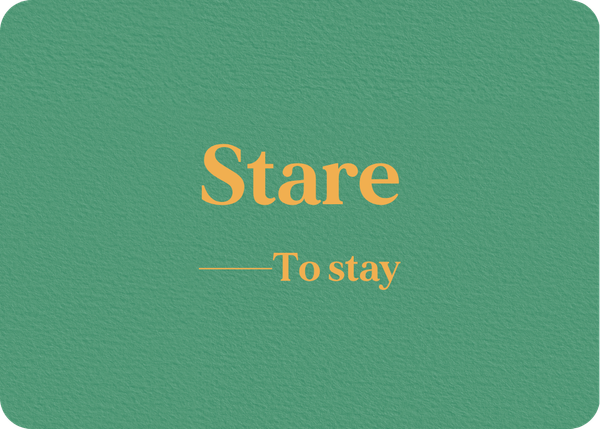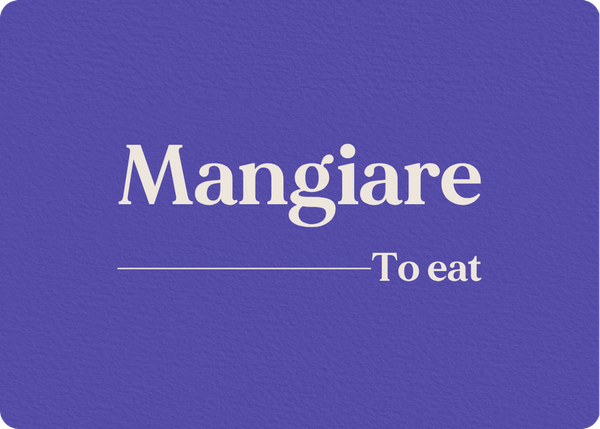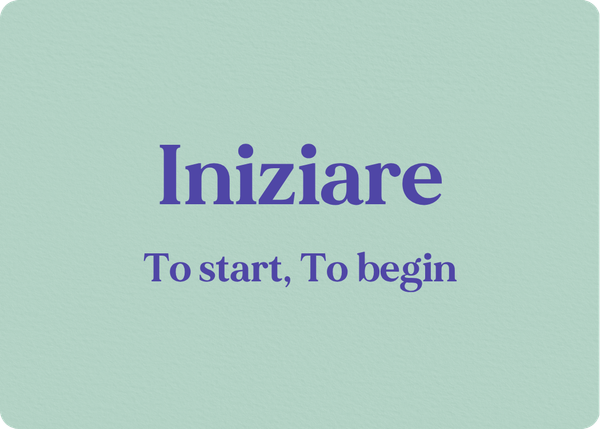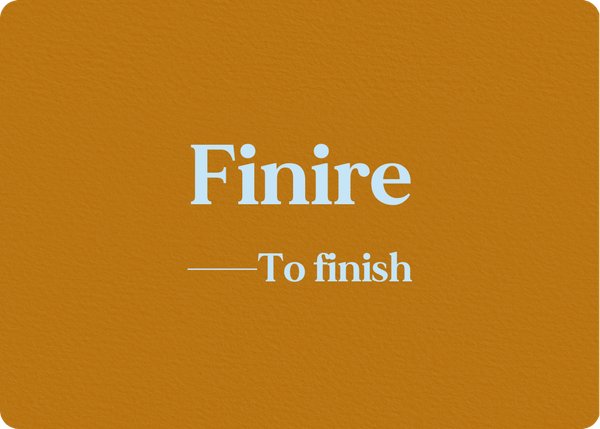What is Stare?
Stare is one of the most essential Italian irregular verbs meaning "to stay", "to remain", or "to be" (in certain contexts). It belongs to the first conjugation (-ARE verbs) but is irregular in many tenses. This fundamental verb is useful for expressing states of being, location, continuous actions (with gerund), and is one of the most frequently used verbs in Italian conversation and writing.
Key Features of Stare:
- Type: Irregular first conjugation verb (-ARE)
- Meaning: To stay, to remain, to be (location/temporary state), to stand
- Irregularities: Present tense (sto, etc.), simple past (stetti, etc.), future (starò), present subjunctive (stia), imperfect subjunctive (stessi), conditional (starei), imperative (stai/sta', etc.)
- Auxiliary verb: Uses "essere" (to be) for conjugation in compound tenses
- Past participle: Stato
Indicativo – Indicative Mood
Presente (Present Tense)
| Person | Conjugation |
|---|---|
| io | sto |
| tu | stai |
| lui/lei | sta |
| noi | stiamo |
| voi | state |
| loro | stanno |
Example:
I bambini stanno dormendo.
The children are sleeping.
Passato Prossimo (Present Perfect)
| Person | Conjugation |
|---|---|
| io | sono stato/a |
| tu | sei stato/a |
| lui/lei | è stato/a |
| noi | siamo stati/e |
| voi | siete stati/e |
| loro | sono stati/e |
Example:
Ieri siamo stati a casa tutto il giorno.
Yesterday we stayed at home all day.
Imperfetto (Imperfect)
| Person | Conjugation |
|---|---|
| io | stavo |
| tu | stavi |
| lui/lei | stava |
| noi | stavamo |
| voi | stavate |
| loro | stavano |
Example:
Durante il liceo, tu e Gaia stavate sempre insieme.
During high school, you and Gaia were always together.
Trapassato Prossimo (Past Perfect)
| Person | Conjugation |
|---|---|
| io | ero stato/a |
| tu | eri stato/a |
| lui/lei | era stato/a |
| noi | eravamo stati/e |
| voi | eravate stati/e |
| loro | erano stati/e |
Example:
Ero stato male per giorni prima di andare dal medico.
I’d been sick for days before I went to the doctor.
Passato Remoto (Simple Past)
| Person | Conjugation |
|---|---|
| io | stetti |
| tu | stesti |
| lui/lei | stette |
| noi | stemmo |
| voi | steste |
| loro | stettero |
Example:
Negli anni della giovinezza, stettero a Roma per alcuni anni.
In their youth, they stayed in Rome for some years.
Trapassato Remoto (Past Anterior)
| Person | Conjugation |
|---|---|
| io | fui stato/a |
| tu | fosti stato/a |
| lui/lei | fu stato/a |
| noi | fummo stati/e |
| voi | foste stati/e |
| loro | furono stati/e |
Example:
Dopo che fu stato via per mesi, finalmente tornò a casa.
After he had been away for months, he finally returned home.
Futuro Semplice (Simple Future)
| Person | Conjugation |
|---|---|
| io | starò |
| tu | starai |
| lui/lei | starà |
| noi | staremo |
| voi | starete |
| loro | staranno |
Example:
Barbara starà con noi durante le vacanze estive.
Barbara will stay with us during the summer holidays.
Futuro Anteriore (Future Perfect)
| Person | Conjugation |
|---|---|
| io | sarò stato/a |
| tu | sarai stato/a |
| lui/lei | sarà stato/a |
| noi | saremo stati/e |
| voi | sarete stati/e |
| loro | saranno stati/e |
Example:
Tra un anno saremo stati in questa città abbastanza a lungo da conoscerla bene.
In a year we will have been in this city long enough to know it well.
Congiuntivo – Subjunctive Mood
Presente (Present Subjunctive)
| Person | Conjugation |
|---|---|
| che io | stia |
| che tu | stia |
| che lui/lei | stia |
| che noi | stiamo |
| che voi | stiate |
| che loro | stiano |
Example:
Spero che tu stia bene.
I hope you are well.
Passato (Past Subjunctive)
| Person | Conjugation |
|---|---|
| che io | sia stato/a |
| che tu | sia stato/a |
| che lui/lei | sia stato/a |
| che noi | siamo stati/e |
| che voi | siate stati/e |
| che loro | siano stati/e |
Example:
Penso che siano stati molto gentili con te.
I think they were very kind to you.
Imperfetto (Imperfect Subjunctive)
| Person | Conjugation |
|---|---|
| che io | stessi |
| che tu | stessi |
| che lui/lei | stesse |
| che noi | stessimo |
| che voi | steste |
| che loro | stessero |
Example:
Non capivo se lei stesse parlando sul serio.
I couldn’t tell if she was being serious.
Trapassato (Past Perfect Subjunctive)
| Person | Conjugation |
|---|---|
| che io | fossi stato/a |
| che tu | fossi stato/a |
| che lui/lei | fosse stato/a |
| che noi | fossimo stati/e |
| che voi | foste stati/e |
| che loro | fossero stati/e |
Example:
Se fosse stato più paziente, avrebbe avuto successo.
If he had been more patient, he would have been successful.
Condizionale – Conditional Mood
Presente (Present Conditional)
| Person | Conjugation |
|---|---|
| io | starei |
| tu | staresti |
| lui/lei | starebbe |
| noi | staremmo |
| voi | stareste |
| loro | starebbero |
Example:
Staresti bene con quel vestito.
You would look good in that dress.
Passato (Past Conditional)
| Person | Conjugation |
|---|---|
| io | sarei stato/a |
| tu | saresti stato/a |
| lui/lei | sarebbe stato/a |
| noi | saremmo stati/e |
| voi | sareste stati/e |
| loro | sarebbero stati/e |
Example:
Sarei stato più felice se fossi venuto anche tu.
I would have been happier if you had come too.
Imperativo (Imperative)
| Person | Conjugation |
|---|---|
| (tu) | stai / sta' |
| (lui/lei) | stia |
| (noi) | stiamo |
| (voi) | state |
| (loro) | stiano |
Example:
Sta' tranquillo, tutto andrà bene!
Stay calm, everything will be fine!
Indefinite Moods
Infinito (Infinitive)
- Presente (Present): stare (to stay/be)
- Passato (Past): essere stato (to have stayed/been)
Examples:
È bello stare in famiglia.
It's nice to be with family.
Essere stato lì è stata un'esperienza fantastica.
Having been there was a fantastic experience.
Participio (Participle)
- Passato (Past): stato (stayed/been)
Example:
Siamo stati in silenzio per mezz’ora.
We were silent for half an hour.
Gerundio (Gerund)
- Presente (Present): stando (staying/being)
- Passato (Past): essendo stato (having stayed/been)
Examples:
Mi rilasso stando al sole.
I relax by staying in the sun.
Essendo stato a Firenze molte volte, conosce bene la città.
Having been to Florence many times, he knows the city well.
The verb Stare at a glance: Key tenses you need
| Present | Present Perfect | Imperfect | Present Subjunctive | Imperfect Subjunctive | Present Conditional |
|---|---|---|---|---|---|
| io sto | io sono stato/a | io stavo | che io stia | che io stessi | io starei |
| tu stai | tu sei stato/a | tu stavi | che tu stia | che tu stessi | tu staresti |
| lui/lei sta | lui/lei è stato/a | lui/lei stava | che lui/lei stia | che lui/lei stesse | lui/lei starebbe |
| noi stiamo | noi siamo stati/e | noi stavamo | che noi stiamo | che noi stessimo | noi staremmo |
| voi state | voi siete stati/e | voi stavate | che voi stiate | che voi steste | voi stareste |
| loro stanno | loro sono stati/e | loro stavano | che loro stiano | che loro stessero | loro starebbero |
Conclusion
Mastering the conjugation of "stare" is useful for expressing states of being, location, and continuous actions in Italian. This highly irregular first conjugation verb requires careful attention to its unique forms in many tenses.
Remember the key points:
- Uses "essere" as auxiliary verb in compound tenses
- Highly irregular verb with unique forms in many tenses (present, simple past, subjunctive, imperative, etc.)
- Past participle is "stato"
- Essential for continuous tenses (stare + gerund: "Sto mangiando" = I am eating)
- Fundamental for expressing location, condition, and ongoing actions
Keep practicing with real sentences and contextual examples to master this Italian verb!





